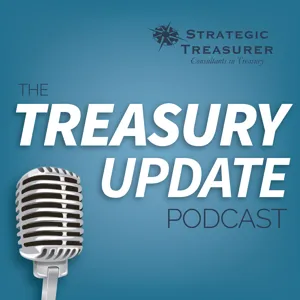Podcast Summary
Empowering educators through iConnections funds for teachers initiative: The Wall Street Skinny team supports educators by joining the advisory board for iConnections funds, enabling them to access professional development opportunities at Ron Clark Academy.
The Wall Street Skinny team is passionate about education and has joined the advisory board for iConnections funds for teachers initiative. This organization aims to empower educators nationwide by providing access to the Ron Clark Academy's professional development opportunities. The funds raised through events will directly benefit teachers to participate in these groundbreaking training programs. The team also discussed the relevance of the TV show "Jury Duty" to the topic of ethical questions raised by technological advancements, particularly in the context of AI and its role in our jobs and daily lives. They also touched upon the ethical dilemmas and sociological implications of humanity's progress on the precipice of significant technological and sociological leaps. A surprising revelation was that AI can have hallucinations, making up things that don't exist, which adds to the ethical concerns surrounding its capabilities and impact on society.
Navigating the Risks and Consequences of Advanced Technology: As technology advances, a new ethical, legal, and scientific framework is needed to address potential risks and consequences. In the job market, the debate is not about humans vs machines, but about who can best use machines to augment skills and improve.
As technology continues to advance at an unprecedented rate, particularly in the fields of AI and quantitative trading, there is a growing need for a new ethical, legal, and scientific framework to navigate the potential risks and consequences. This was highlighted in a conversation about the potential dangers of pushing the button on advanced technology, which could theoretically destroy the world, but is seen as a low probability event. Similarly, in the job market, particularly in the tech and financial services industries, there is a debate about the role of humans versus machines, but it's not yet about humans versus machines directly. Instead, it's about who can master the use of machines to augment their skills and improve themselves. Our guest, Harry Mamieski, a professor at Columbia University and former trader at Citigroup, will discuss the role of quantitative trading in the financial services industry, what it takes to get a job as a quant, and the role of AI in this brave new world of market technology.
Using AI for efficient text analysis in finance: AI and NLP techniques help investors digest info from various sources, summarize key points, and focus on important data in finance.
The use of AI and natural language processing techniques in analyzing text to extract valuable information and understand market reactions is a growing area of research and application in finance. The speaker, with a background as a prop trader and academic, shares how their personal experience of spending most of their time reading research reports, 10-Ks and Qs, news articles, and earnings calls led them to recognize the potential of automating and making more efficient the process of extracting relevant information from text. This can help investors digest information from a larger number of sources, summarize key points, and focus on the most important information. The speaker's research and teaching reflect their passion for combining academic and practical work, and their firm, Quan Street, reflects this approach by offering quantitative asset allocation services, separately managed accounts, wealth advisory, and collaborating with other institutions. The differentiation of Quan Street from a hedge fund lies in its focus on managing investment portfolios for clients and providing advisory services, rather than pooling and managing capital for a select group of investors.
Long-only investing vs hedge funds: QuantStreet applies research skills and financial expertise to long-only asset allocation, while hedge funds take large, focused bets with higher risk using derivatives
While QuantStreet and hedge funds use similar analytics and datasets to identify relative value between asset classes, their approaches to trading and risk management differ significantly. QuantStreet focuses on long-only investing, making underweight or overweight decisions at the margin, while avoiding leverage and short selling. In contrast, hedge funds often take large, focused bets using derivatives like credit default swaps, and manage those positions tightly due to the higher risk involved. The speaker's decision to start QuantStreet came from a desire to apply his research skills and financial expertise to intelligent asset allocation for himself and his family, rather than just following the conventional investment strategies.
Considering Personal Circumstances and Risk Tolerance in High-Risk Investments: Personal circumstances and risk tolerance impact investment decisions. A systematic approach, including models and machine learning, can help determine risk tolerance and generate investment ideas, but it's crucial to consider individual preferences and constraints to avoid unwise investments.
Personal circumstances and risk tolerance play a significant role in the decision to engage in high-risk investments, such as trading. For some, like the speaker and his brother, the attraction may be the opportunity to work together as a family business. However, for others, the high-frequency nature of trading may not align with their personal risk tolerance or professional goals. The speaker shared his experience of feeling pressured to trade even when he didn't have good ideas, leading to potentially unwise investments. To help clients determine their risk tolerance, the speaker's business uses a systematic approach, including models and machine learning, to generate ideas, but also imposes constraints based on clients' risk preferences. By using examples of potential drawdowns, they can help clients understand the potential losses associated with different investment strategies and customize portfolios accordingly. Ultimately, it's essential to consider personal circumstances and risk tolerance when deciding whether to engage in high-risk investments.
Intuition and Analytics in Trading and Finance: Intuition sets the foundation, while analytics helps build upon it by considering all possible market influences and providing more informed investment decisions. AI and models help filter through data, but human intuition is crucial for understanding the reasoning behind their recommendations.
Intuition plays a crucial role in trading and finance, but it's limited in scope. Our intuition may lead us to believe certain factors influence the market, but there are often many more factors at play. This is where data analytics and models come in. They help codify our intuition and consider all possible influences, allowing for more informed investment decisions. In the current world, AI and automation are increasingly top of mind, leading to the automation of sales and trading roles. However, this doesn't mean the human intellect is replaced entirely. Instead, AI and models help filter through massive amounts of data to extract salient data points and form them into cogent investment theses. The challenge lies in weeding out noise versus signal. When humans aren't involved in the initial data filtering process, it's essential to trust the models' accuracy and transparency. This is where intuition still plays a role, as it helps traders understand the reasoning behind the models' recommendations. In essence, intuition and analytics go hand in hand. Intuition provides the foundation, while analytics helps build upon it, taking into account all possible influences and providing more informed investment decisions.
Data, computation, and open-source software have revolutionized investing: Advancements in data availability, affordable computation, and open-source software have transformed investing, enabling analysis of vast amounts of data and collaboration on powerful tools
The last few decades have seen significant advancements in data availability, affordable computation, and open-source software that have revolutionized investing as we know it. Firstly, the abundance of data is a game-changer. Thirty years ago, data was scarce and difficult for machines to process. Today, data is everywhere, and we're constantly capturing more of it in machine-readable formats. This data comes in various forms, including text, videos, satellite imagery, and real-time consumer surveys. Secondly, the cost of computation has plummeted, making it accessible to everyone. A modern smartphone now has the computational power of a supercomputer from decades ago, and it's almost free. This has given us the tools to analyze the vast amounts of data at our disposal. Lastly, open-source software has been a game-changer. In the past, we had to write code from scratch or rely on proprietary software. Today, we have platforms like GitHub and GitLab, which allow us to collaborate on code with people all over the world. This has led to the widespread use of free tools like Python and R, which are maintained by a community of volunteers. This collaboration has led to rapid updates and improvements, making these tools invaluable in the world of quantitative investing.
Open-source coding ecosystem revolutionizes data analysis: The open-source coding ecosystem enables faster and more efficient data analysis through pre-existing algorithms, free access, and the integration of AI
The open-source coding ecosystem has revolutionized the way we interact with massive datasets and use advanced computational power. Before this, tasks that used to take a month can now be accomplished in a day. This is due to the existence of pre-existing algorithms, like the one mentioned from the book, which have been implemented, documented, tested, and maintained by the coding community. Anyone can access and use these packages for free. This includes individuals with no prior knowledge of coding, as well as experts with PhDs. The popularity of coding courses in educational institutions further underscores this trend. Moreover, the advent of AI adds another layer to this revolution. With AI, computers can write new code automatically, making the process even more efficient. However, it's important to note that the code generated by AI may require modifications for optimal performance. This is similar to how a base generated by AI can be improved upon by a human. The open-source coding ecosystem has made advanced computational power accessible to everyone, allowing for faster and more efficient data analysis. It's a game-changer in various industries, including education, business, and research.
Using data analysis tools to enhance investing: Data analysis tools can help identify potential mispricings, but human intuition and oversight are still crucial in investing. Models should be used as a tool to augment human analysis, not replace it.
While intuition and human analysis are important in investing, taking advantage of advanced data analysis tools can significantly improve the investment process. However, these models have limitations and may not perform well during disruptive episodes. It's essential to understand the context and consider the unique circumstances that may not be captured by the models. The industry is transitioning towards a more data-driven approach, but human intuition and oversight remain crucial. Models can identify potential mispricings that may be overlooked, but they are not infallible and should be used as a tool to augment human analysis rather than replace it. The challenge lies in separating the valuable signals from the noise, which requires a healthy dose of skepticism and a deep understanding of the underlying market dynamics.
Models struggle with abstract concepts and inflection points: Models can identify trends and mispricings but struggle with new information and complex situations. Human abstract thinking and understanding of context are necessary for accurate predictions at inflection points.
While models and AI have made significant strides in analyzing data and making predictions, they still face limitations, particularly when it comes to understanding abstract concepts and identifying inflection points. Models are effective in identifying trends and mispricings in steady states but struggle when dealing with new information or complex situations. Data can also break models if not managed properly. Machine learning techniques help in selecting useful data and discarding irrelevant data points. AI models, on the other hand, excel in handling large amounts of data and figuring out which data is necessary, but the reasons behind their success are not fully understood. Ultimately, human abstract thinking and understanding of context are essential for making accurate predictions at inflection points, something that models and AI currently lack.
Understanding Quantitative Tools in Finance: Finance professionals need to code and analyze data to effectively use quantitative tools and stay competitive, with the industry moving towards a more data-driven approach.
The use of models and data analysis is becoming increasingly important in the finance industry, and the ability to code and understand quantitative tools is becoming essential for those looking to enter the field. The models used in finance are constantly being refined and updated, with tinkering ranging from light to heavy. Light tinkering involves deciding how much weight to give to trend components versus model outputs, while heavy tinkering may involve adding new variables or even replacing entire models. As technology continues to advance, finance professionals will need to be conversant in coding to effectively use quantitative tools and stay competitive in their careers. The finance industry is moving towards a more data-driven approach, and those who can code and analyze data will be in high demand.
The importance of coding and AI in finance: A strong foundation in coding and understanding of AI technologies is essential in finance for automating tasks, enhancing decision-making, and staying competitive. Obtaining a quantitative master's degree is a common pathway to gain necessary skills, but having both coding and AI knowledge provides a competitive edge.
Having a strong foundation in coding and understanding of AI technologies is becoming increasingly important in the finance industry. This was emphasized by the speaker's personal experience of observing a colleague's productivity advantage using Excel versus a calculator, and the potential for AI to automate tasks previously requiring coding knowledge. The speaker also mentioned the evolving industry trend towards more systematic and granular modeling, and the potential for AI to enhance human decision-making. For young people looking to enter the industry, obtaining a quantitative master's degree is a common pathway to gain the necessary skills and knowledge. However, the speaker also noted that AI is not yet a replacement for coding, and having both skills would provide a competitive edge. Overall, the message is that staying informed and adaptable to technological advancements is crucial for success in finance.
Academia provides tools, industry experience is crucial for trading success: While academia equips graduates with essential skills, industry experience through apprenticeships is vital for mastering trading and risk management. Most graduates start in research or sales roles, not directly in trading, and a PhD is not required but a master's degree can help.
While academia can provide essential tools and knowledge for quantitative finance roles, the industry experience, particularly through an apprenticeship, is crucial for mastering the skills required to be successful in trading and risk management. Most graduates do not go directly into trading roles but instead take positions in research or sales at investment firms, with a minority entering hedge funds. A PhD is not necessary for industry roles, but a master's degree can be beneficial for learning the necessary skills. The financial industry offers various opportunities beyond just trading and hedge funds, and students should be open to exploring these options to gain a well-rounded understanding of the field.
Careers in Finance Beyond Banking and PE: Explore career paths in quantitative finance, investment advisors, and financial institutions. Learn Python and data analysis skills for opportunities. Compensation evolving towards salaries.
There are various career opportunities in finance beyond the commonly known paths in private equity and banking. Many companies, especially those in the quantitative field like investment advisors and financial institutions, hire students and professionals to make financial decisions using quantitative tools. These roles are not limited to those with an MBA or a specific master's degree; learning programming languages like Python and data analysis skills can open doors to these opportunities. The compensation structure in these roles is evolving, moving away from incentive-based pay towards a more traditional salary structure, reflecting the increasing importance of teamwork and collaboration in managing large-scale financial portfolios.
The financial industry is becoming more equitable in compensation: Algorithms and decreasing fees lead to less salary dispersion in the financial industry. Success requires open-mindedness and networking.
The financial industry, particularly hedge funds, is becoming more systematic and equitable in terms of compensation. With the rise of algorithms and decreasing fees, the industry is moving towards a more level playing field where there is less dispersion in salaries. However, listening to facts and being open-minded, rather than just supporting preconceived beliefs, is crucial for success in investing. Additionally, networking and building relationships are essential for career growth, especially for those looking to transition from being an employee to running their own business.
Effective communication and networking are key to career growth: Intellectual capacity is necessary but not sufficient for career advancement. Building relationships and effective communication are crucial differentiators.
Networking and communication skills are crucial for career advancement beyond just being academically excellent. This was emphasized by Harry, who shared his experience of building his career through leveraging his network despite having limited knowledge in finance. He also mentioned that social media is now a powerful tool for networking. Harry emphasized that intellectual capacity is necessary but not sufficient for career growth, and effective communication and networking are the differentiators between those who advance and those who don't. This is an important lesson for those who excel in academics but may struggle with networking and communication skills. Overall, the conversation highlighted the importance of building relationships and effectively communicating in the professional world.




